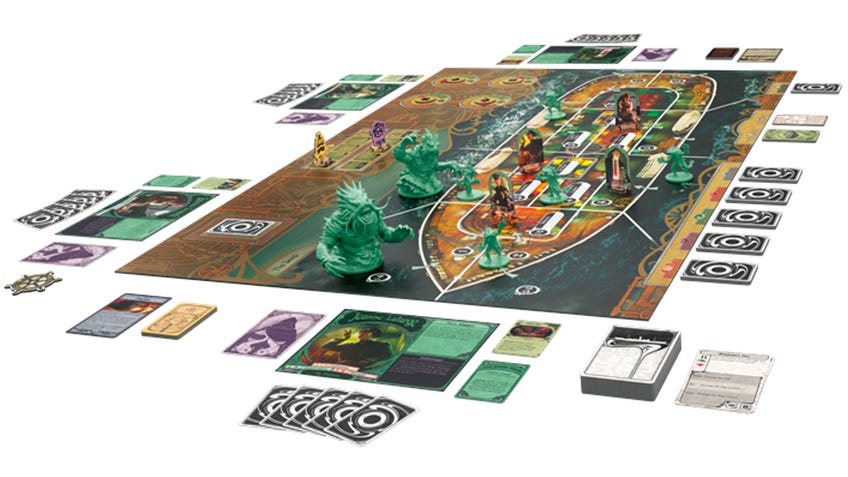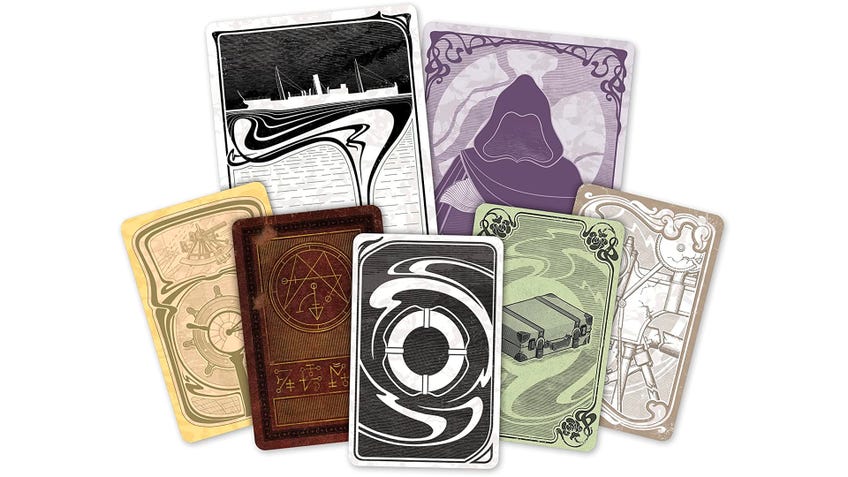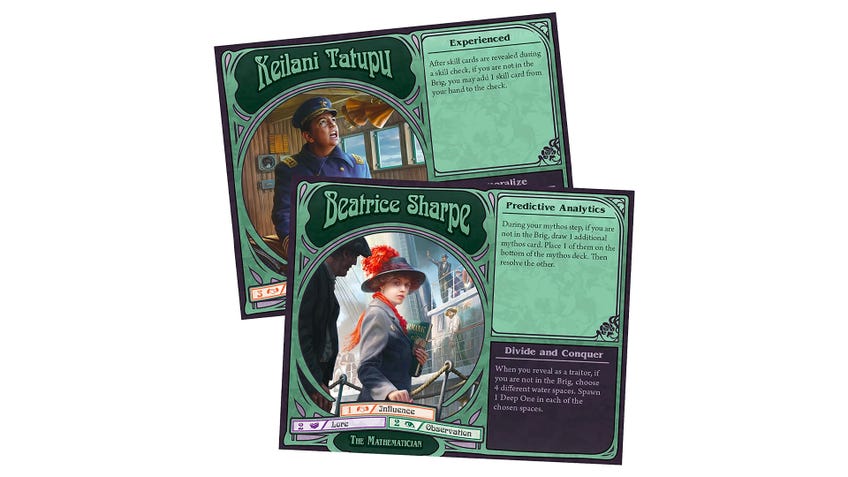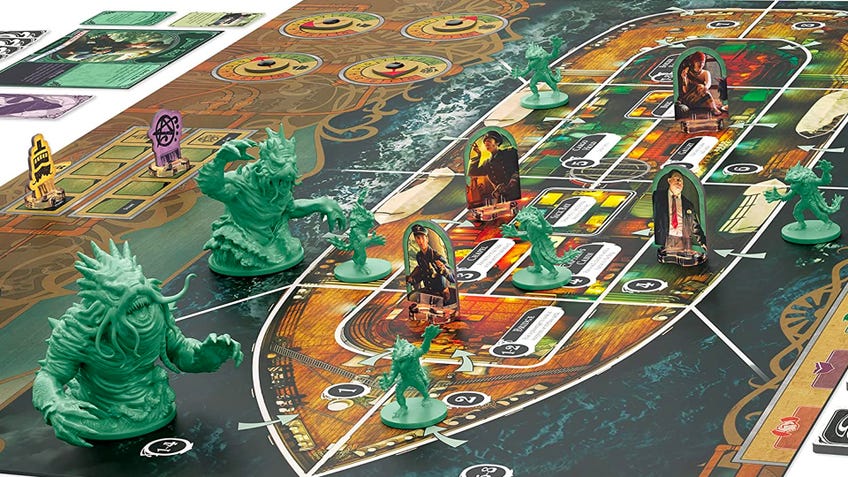Unfathomable board game review: Battlestar Galactica meets Arkham Horror in social deduction game likely to test friendships - and patience
Treachery at sea.
Released in 2008, Corey Konieczka’s Battlestar Galactica: The Board Game was one of those rare licensed games that perfectly married mechanics and flavour. The social deduction game used the show’s concept - a harried human fleet facing an intractable foe threatening to destroy them through both space battles and internal sabotage - to create play sessions that could feel as tense and memorable as a great episode of television.
While the game spawned numerous expansions that continued the show’s storylines, it’s been out of print for years and is unlikely to return due to licensing disputes. Publisher Fantasy Flight’s solution was to enlist Tony Fanchi, who co-designed Star Wars: Outer Rim with Konieczka, to reskin Battlestar Galactica and make it part of the company’s popular Arkham Horror Files line. The result is Unfathomable, which is unlikely to be worth buying for anyone lucky enough to have a copy of Galactica. While it streamlines some of the original game’s issues, it doesn’t do enough to incorporate innovations in the social deduction genre made in the last 13 years.

The basic mechanics of Unfathomable and Battlestar Galactica are almost identical. Rather than controlling a massive spaceship fighting off aggressive machines, players in Unfathomable are guiding the SS Atlantica on a voyage across the Atlantic where it’s beset by Lovecraftian horrors. While most of the players want to reach land safely, some are secretly fish-like hybrids siding with the sea monsters trying to drag everyone down to a watery grave.
The number of traitors you have is dependent on the number of players, but you’re always going to have at least one. However, you might not start with one in smaller games, with new loyalties being dealt out once the players have made it halfway to their destination. It creates the same sort of complicated dynamics as Betrayal at House on the Hill's haunts, with players trying to avoid letting any individual amass too much power while also trying to get into the best position possible before the second phase of the game begins. Depending on the game state and your personality, changing teams halfway through the game can be frustrating or exhilarating.
The second part of the game can be quite short given how devastating traitors can be. For the most part, your ship inches across the sea when you deal with crises, where players must secretly place cards in a pile - along with two randomly determined cards that add an element of extra chaos and provide cover to saboteurs. The goal is to have a sufficient value of the right sort of cards to pass the challenge, but cards of the wrong type deduct from your successes. Typically the best you can hope for when winning a challenge is that nothing bad happens. Failing can result in a loss of vital resources or damage to your ship that reduces the types of actions you’re capable of taking and can eventually cause the humans to lose the game and the hybrids to win.
The game can feel challenging even if you’re not sure if you’re being actively undermined.
Battlestar Galactica instructed players to be vague about what cards they were putting in to make things easier on traitors. That policy is missing from Unfathomable’s rulebook, but we played with it anyway. Still, the random nature of the crisis and the cards you draw each turn means that the game can feel challenging even if you’re not sure if you’re being actively undermined.

The narrow margin of error, combined with the fact that the primary strategy for traitors is to pretend to cooperate but play as inefficiently as possible, means that you’re practically required to have a quarterback who works to keep track of every character’s capabilities and the available actions on the board to try to plot out the best moves possible. I tried to avoid doing that in my playthrough with friends who tend to dislike being micromanaged, only to wind up getting burned by a traitor who just didn’t speak up about her starting item, which would have made her better at eliminating the deep ones crawling all over our ship. When she claimed to have been misreading rules or kept taking the same basic actions, I attributed that to her having said she’d gotten a bad night’s sleep long before the loyalty cards were dealt out.
You really need everyone at the same skill and engagement level to avoid hurt feelings and recriminations.
That’s on me for giving someone in a social deduction game too much of the benefit of the doubt, but it points to one of the core problems of the genre and Unfathomable in particular. You really need everyone at the same skill and engagement level to avoid hurt feelings and recriminations, because it can otherwise be hard to tell the difference between honest mistakes and intentional misplays. People need to be prepared for you to want to look over all of their visible cards and cast aspersions on them if they’re not making the best plays possible.
Sure, the self-designated quarterback could be a traitor, but that should be easy to suss out if other players are paying attention. More recent games such as Dead of Winter and Game of Thrones: Oathbreaker give every character specific objectives so that loyal characters have a reason to sometimes act selfishly and traitors need to occasionally cooperate. There is a cultist role in Unfathomable that’s similar, since they need the humans to fail right when they’re on the verge of winning, but that seems like an impossibly difficult task compared to just sinking the ship or eating all the vulnerable passengers.
Unfathomable doesn’t do enough to distinguish itself from the many other Cthulhu-themed and social deduction games on the market.
Once suspicions are getting high, it’s usually best to just reveal yourself as a traitor and take advantage of the devastating impact each character has when they flip, such as the engineer’s ability to immediately sabotage a spot on the map. Unfathomable is a long game, played over two to four hours - depending on the number of players and how much the rules need to be explained - that can turn into a slow war of attrition as the loyal humans stubbornly fight to survive. An abrupt end can sometimes be a mercy to the other players.

Fanchi worked to bring depth to each of the game’s characters, none of whom have appeared in any of the Arkham Horror Files games before, by giving them complex backstories and even individual crises reminiscent of those in Dead of Winter. But they’re still fundamentally defined by their role on the ship and Lovecraftian archetypes. It’s hard to build up the same connection fans of Battlestar Galactica could feel to their favourite characters and the way Konieczka matched their abilities, personalities and drawbacks so well. Unfathomable ditches the space combat in favour of brawls on deck, which makes the game simpler for better and worse. Slugging a deep one in the face just doesn’t feel as satisfying as scrambling vipers did.
The fundamental problem with Unfathomable is that it doesn’t do enough to distinguish itself from the many other Cthulhu board games and social deduction games on the market. If you love both the theme and the genre, this is a solid pickup. Otherwise you’re likely to find smoother sailing elsewhere.


